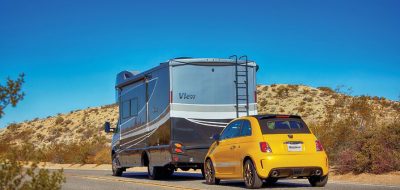Trailer hitches are found on just about every pickup truck, SUV and of course motorhomes. These hidden hitches consist of a square receiver, 1-1/2” to 2-1/2” which holds an inserted drawbar and ball. Mostly motorhomes use these to flat tow a vehicle. This uses a hitch assembly that is fastened to the front of the towed vehicle and pulls it with all four tires on the ground. Thus, in this case, it has no tongue weight or downward weight on the hitch itself.
There are, however, motorhome owners that choose to tow a trailer that carries their car or other payload. This type of towing requires a certain amount of weight on the trailer hitch at the ball. This weight must be about 10% of the overall gross trailer weight, which includes the payload. If the amount is much less than this, a dangerous situation can result as the trailer may tend to wag from side to side while towing.
In an effort to reduce the risks of being too light at the hitch, people may overload it. Hitches are generally rated from 1,500 to 20,000 lbs. This is the maximum gross weight of the tow it can handle. So, if a hitch rating was 5,000 lbs. it would take a maximum of about 500 lbs. of weight at the trailer hitch ball. If you were to increase this to 1,500 or 2,000 lbs. by front loading the weight, the hitch may well be over stressed and fail. That failure can result in the hitch separating from the rear of the tow vehicle.
So, one must determine how to attain that approximate 10% weight on the hitch. Adjusting the weight in a car hauler requires only positioning the car more or less forward in the trailer. Any payload has to be placed and secured at the approximate correct balance also.
In addition, a regular inspection should be carried out on the hitch assembly and its attachment to the vehicle.
This is best accomplished by your local RV or trailer dealer. Overweight stress or physical impact damage can result in cracks or other structural failures that might otherwise go un-noticed.
The photo to the right shows a structurall failure of the attached mounting. If this was not discovered, a total vehicle to trailer separation was eminent. Additionally, many of the safety chains are also attached to the hitch itself, as is evident here. This would allow the trailer to be totally free from the tow vehicle instantly.
So, load and secure your trailer well, then you can relax and enjoy.







Anonymous
I appreciate that you point out to have a local trailer dealer regularly inspect the hitch assembly and its attachment to the vehicle. I can see why this would be a good idea to make sure that everything is safely secure. My dad is thinking about getting a truck with a hitch so that he can take his boat up to the lake. I’ll have to make sure that he has it regularly inspected before the start of a new season.